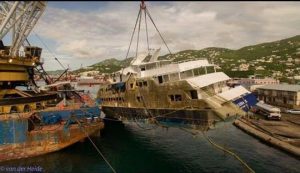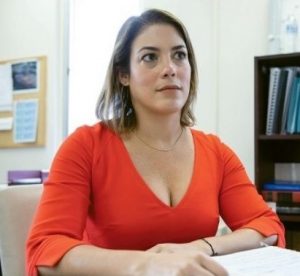During and after the crisis caused by Maria, we saw community leaders and volunteers emerge and come forward in response to the needs of our fellow neighbors. We discovered strength, talent, inventiveness, and a desire to fix what was broken and make things better for all of us in Vieques. We united in a mission to save the island. Most residents pulled together as a team regardless of their allegiances to any political party. Through these efforts we did more than survive: we discovered what could be done through our collective, focused action. We saw the huge inadequacies in our pre-Maria government services. We were knocked over by the revelations of Rickyleaks and realized beyond any doubt that our emperors had no clothes.
The usual practices of the Blue and Red have been responsible for much of the retardation of our island’s growth and opportunities for success. The constant flip-flop of power between the parties was an endless recycling of the gravy train for high level political elites, but it was an absolute disaster for the people of Puerto Rico. Traditionally, the self-serving patronage practices in Vieques have caused destructive partisan hiring practices and shifted the focus from “What’s good for Vieques?” to “What’s good for my party and my reelection?” Any long-term solution to the many problems of our island requires a unified renovation of our existing formal political structure in Vieques.
We have all become quite cynical when viewing local politics, so it is hard to have a significant discussion on how to change our system to cater to the needs of the island. We know we are the tail of the dog and that we will not be able to change the party or voting process. On the other hand, we might be able to change the outcomes while utilizing the existing legal procedures. What if we shifted the orientation of our own electorate and created support for candidates from any party who have platforms that address the critical needs of our island.
We should form a “sub-party”, call it the Sato Group (or something clever), whose role it is to establish a platform that anyone can endorse and pledge to honor. The Satos will then aid and assist the most credible candidate(s) in their efforts to get elected regardless of party affiliations.
The Sato Platform
The platform should be based strictly upon elements that are important to the growth, health, well-being, and future of Vieques. Not everyone will have the same vision, nor will all agree on the specifics of issues, but we must, as a group, reach consensus on the basics. Have the Blue and the Red ever really stood for the improvement of Vieques? Components of the platform might include:
- Communications and information distribution from the municipio should become a daily routine and receive a very high priority to keep citizens aware of opportunities and all government activities
- Transparency in all government activities spending money, awarding contracts, planning, etc. – everything but real time personnel and legal procedures/negotiations.
- Hiring should be based upon integrity, education, experience, skills, performance, and appropriateness of the job fit – not on personal or political affiliations. Our government team is only half as strong as it could and should be when we don’t make use of the good people of both parties: the best people we have available!
- Municipal positions should be created and maintained only for the most necessary and critical functions – not as welfare or patronage
- Land titles to all municipal lands should be solidified through proper surveys and legal procedures to encourage the sale of applicable properties: those justly in the possession of the inhabitants or vacant/derelict/abandoned properties for community development
- Random Central Government real estate parcels and buildings not being used for PR purposes should be deeded to Vieques
- Through increased autonomy, the municipality should take over all property tax functions – from record keeping, to appraisal, to tax collection – CRIM in Vieques should be totally eliminated
- Grant writing should become a very high priority to secure funding for the many needs of the island – consultants should be contracted if necessary
- The ferry service to and from Ceiba should be owned by the municipality as a government entity or a cooperative, and the operation should be contracted out BUT controlled locally – subsidies would be negotiated with PR and the Federal Transportation Administration
- Electrical power generation through mostly solar and distribution through micro-grids should be owned by the municipality as a government entity or a cooperative, BUT the operation should be contracted out and controlled locally
- For all but extreme cases, criminal and civil violations or complaints should be arraigned and tried in Vieques – even if it must be accomplished by video conferencing – and a short-term jail should be provided and equipped to obviate the need for transport
- Our local government should become involved in liaison and lobbying for any and all-important Central Government and institutions providing services to Vieques citizens (such as healthcare, education, social services, and economic development)
- Replacement of the inventory tax for Vieques businesses
- Work with PR economic development offices to utilize Promise Zone, Free Economic Zone, and Opportunity Zone programs to our advantage
- Given the ever-declining likelihood of obtaining direct government funding for the repairs, rebuilding, and new development of necessary programs and infrastructure, the municipality will need to aggressively foster strong relationships with local nonprofits and national grant sources to fund essential projects and economic development.
So much for my thoughts. Now:
- Would you support an effort to encourage our local candidates to pledge to honor this type of commitment?
- What would you add to the list?
- What would you take off?
- What do you think?
Others are working on change: https://portside.org/2019-08-24/puerto-rico-shift-mass-protests-peoples-assemblies


